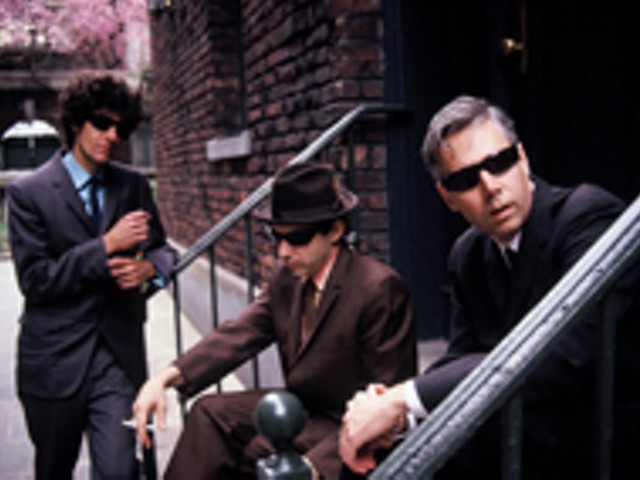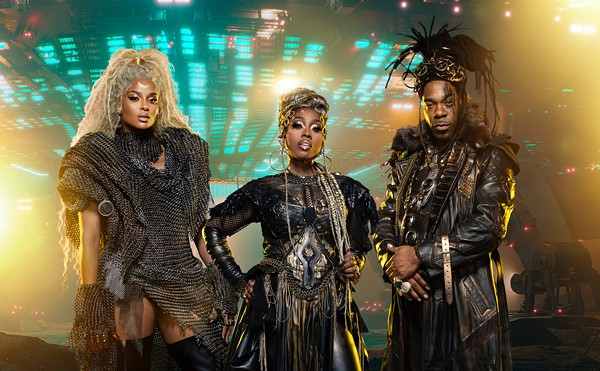Seattle got its rep as a music city because of grunge. No surprise. In the 13 years since the genre flamed out in the worst way imaginable, the city of a half-million has coasted on it. At Pike Place market, sleazy vendors peddle Nirvana T-shirts just like they would Statue of Liberty snow globes in New York. In a Seattle bar, Mudhoney, Soundgarden or Pearl Jam will come on the jukebox in one drink's time. In that bar's bathroom, expect a Sub Pop sticker emblazoned on the stall door.
Because of grunge, Seattle went a decade without a major music movement. But because of Detroit, a major musical movement is happening right now in that city — namely, techno. And representing it to the world is Decibel Festival, a four-day orgy of electronic music — recalling an infant DEMF — that's taken over Seattle's rock club-filled Capital Hill neighborhood for one weekend (and then some) every September for the past three years. Each one is bigger than the last and this year's — beginning on Thursday — is no exception. A minimum of 10,000 people from every point on the globe is expected to converge in nine venues for more than 80 acts, including big names like Simian Mobile Disco, Diplo, Harold Budd, Truckasauras, Lusine and on and on.
Most of the credit for it comes down to two figures, Sean Horton and Jerry Abstract. They're polar opposites in character — Abstract is a walking party, while the meticulous Horton plays the parent — but both come from the same Detroit roots and arrived in the Cascadian sanctuary of Seattle with the same impression: that however clear the air is blowing in from Puget Sound, and however "chill" the Northwest vibe is, something called innovation was missing from Seattle's music scene.
Horton describes Seattle as "less motivated." And growing up in Detroit, witnessing the formative years of one of the country's strongest electronic music scenes, innovation meant boxes and wires, beats and synthesizers, and the strange sounds of electronic music that, to them at least, always meant anything was possible.
Growing up, the pair discovered electronic music in the same way listeners discovered it in Seattle — as surprised outsiders. They would wander into backroom and warehouse parties that were pumping early Detroit techno (although in Seattle then, it was mainly rave-up drum 'n' bass scenes — that is, nothing at all to brag about).
Abstract recalls he lost his techno virginity while wandering around downtown Detroit in the late '80s, looking for a place to take a leak. In the alley, he heard music coming from a doorway, and poked his head in. He wandered up some dark flights of stairs following muffled, pulsing beats until finding his first sign that something was really going on — a couple making out in the stairwell. He moved on and found a small room lined in black plastic with no light, save for a red rotating siren. He didn't dance, stunned by what he was hearing. "It was music that didn't tell you what to do, how to feel," Abstract recalls fondly.
For hours, the teenager stood in front of a massive speaker, just listening.
A few years later — after chasing more parties, meeting new people, buying records — Abstract played his first show at the now-defunct Zoot's, a hallowed ground-zero for many of Detroit's finest electronic artists. Today, Decibel aside, Jerry Abstract is a revered name in the Northwest's electronic music scene and beyond, putting out discs on German techno mainstays Shitkatapult and Musick and spinning at parties across the globe.
The rough-around-the-edges Abstract grew up in Detroit by the Dearborn border, near the scrap yard where his old man worked, a far cry from the sleek dance clubs of Berlin, a brief home of his in the early '80s. In Detroit, he spent much of his time chasing abandoned buildings.
"If you didn't do that, you're not a true native Detroiter!" he exclaims.
As a teen, his mode of transit back and forth to downtown parties was a skateboard (when he was even younger, and for different purposes, it was latching on to boxcars). It was a classic DIY Detroit upbringing.
His Decibel partner Horton (the curator and business brain behind the fest), had it only slightly different, growing up in Berkley. For him, the city center was an escape.
"Berkley was about as normal a Midwest suburb as you could find," he explains "I realized that Berkley and I were no longer compatible and that I needed to leave. I began escaping to Detroit for concerts and, more importantly, underground warehouse parties, [the sort] popularized by Richie Hawtin." He left Berkley for good in 1990, not long after Abstract's first techno encounter.
And, like Abstract, Horton (who now DJs under the moniker Nordic Soul) played his first show at Zoot's, something he stumbled into. "I remember showing up with a bunch of ambient records I had purchased that day and [a friend] invited me back to DJ," he recalls. A first session behind tables and a mixer is so often the moment-of-no-return for technophiles and Horton was no exception.
Tumbling down the same rabbit hole of techno love, it's a wonder Horton and Abstract never crossed paths. Or, maybe they did. Dark rooms and flashing lights don't lend themselves well to introductions.
But that official meeting didn't happen until they had both moved to the Northwest, both having escaped Detroit for the reasons most people leave: Beyond music, opportunities are few.
They met briefly at a gallery show in Seattle, and Abstract came to visit Horton a week later during the latter's DJ set.
"I remember him bringing down a six-pack of Pabst. It was one of those rare male bonding moments that only the combination of beer and techno can really facilitate." Horton had a production company called Dreaming in Stereo — which would later become Decibel — and invited Abstract to be a part, digging both his "stellar DJ skills" and equally adept hand at graphic design (to this day, Abstract does all of the design work for Decibel).
The rest of the tale's simple: The pair has become the largest voice in Seattle, if not the Northwest, in electronic music evangelism. In Seattle, getting 10,000 people to an electronic music festival is a feat in and of itself. DEMF draws four times that, but has different advantages. Says Jason Clark, one of the organizers of Detroit's Movement festival (DEMF): "Detroit's historic relevance to electronic music is ingrained in the minds of most electronic music fans the world over. Combine this with the fact that it is within driving distance of many large metropolitan areas." Seattle, on the other hand, is essentially an outpost —accessible easily to only Portland and Vancouver, B.C. —and has barely a techno root. Decibel's been a feat, indeed.
So, it comes back to Detroit, with its roots and DIY lessons all taken to heart by Abstract and Horton. Horton sums it up: "It's crazy to think that something so inspiring came out of the postindustrial urban decay of Detroit. [I learned] it's not about your surroundings, but the people that inhabit those surroundings and how they choose to excel, regardless of economic status, education or upbringing."
For more info on Seattle's Decibel Festival (runs Sept. 20-23), go to dbfestival.com.
Michael Byrne is freelance writer. Send comments to [email protected]





